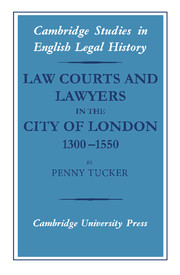Book contents
- Frontmatter
- Contents
- Acknowledgements
- List of abbreviations
- List of figures
- Introduction
- 1 The administration of the law by the city in context
- 2 The distinctiveness of city law and custom
- 3 The city law courts
- 4 The administration of the law in the city's courts: I
- 5 The administration of the law in the city's courts: II
- 6 Judges, jurors and litigants
- 7 The city's law officers
- 8 Legal representation in the city
- 9 The effectiveness of the administration of the law by the city
- 10 Interchange and exchange between the city and the common law
- Appendices
- Bibliography
- Index
2 - The distinctiveness of city law and custom
Published online by Cambridge University Press: 04 August 2010
- Frontmatter
- Contents
- Acknowledgements
- List of abbreviations
- List of figures
- Introduction
- 1 The administration of the law by the city in context
- 2 The distinctiveness of city law and custom
- 3 The city law courts
- 4 The administration of the law in the city's courts: I
- 5 The administration of the law in the city's courts: II
- 6 Judges, jurors and litigants
- 7 The city's law officers
- 8 Legal representation in the city
- 9 The effectiveness of the administration of the law by the city
- 10 Interchange and exchange between the city and the common law
- Appendices
- Bibliography
- Index
Summary
INTRODUCTION
As we have just seen, London's customs were throughout our period liable to be changed to bring them more in line with nationally applicable principles and procedures. That being so, one might ask whether there really was such a thing as ‘city law and custom’, even in 1300, let alone by 1550, by which time the common law had for some four centuries been subject to much thought by men experienced in its application and keen to create of it a coherent body of law.
At first sight, it seems doubtful. By 1300, city law and custom was being described, not as an even semi-coherent body of substantive legal principles and procedural practices, but in terms of its departures from the common law. The impression one gets from the London custumals is that these departures were numerous but often minor, and mainly concerned with procedures: relating, for example, to the opportunities for litigants to essoin themselves (excuse their non-attendance). Differences of this type might well be accounted for by the differing frequencies with which particular law courts met and the need, in the case of courts which met weekly or more often, to allow defendants adequate time in which to respond to a summons and prepare their case. One might ask whether a collection of even a thousand such procedural variations deserved to be called ‘custom’, let alone, ‘law’.
- Type
- Chapter
- Information
- Law Courts and Lawyers in the City of London 1300–1550 , pp. 47 - 83Publisher: Cambridge University PressPrint publication year: 2007



